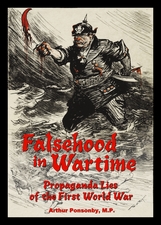 |

Arthur Ponsonby, MP:
Falsehood in Wartime
Propaganda Lies
of the First World War
Reprint edition by The Scriptorium!
"Falsehood is a recognized and extremely useful weapon in warfare, and every country uses it quite deliberately to deceive its own people, to attract neutrals, and to mislead the enemy. The ignorant and innocent masses in each country are unaware at the time that they are being misled, and when it is all over only here and there are the falsehoods discovered and exposed. As it is all past history and the desired effect has been produced by the stories and statements, no one troubles to investigate the facts and establish the truth.
Lying, as we all know, does not take place only in war-time. Man, it has been said, is not "a veridical animal," but his habit of lying is not nearly so extraordinary as his amazing readiness to believe. It is, indeed, because of human credulity that lies flourish. But in war-time the authoritative organization of lying is not sufficiently recognized. The deception of whole peoples is not a matter which can be lightly regarded..."
Thus begins this well-known book by the Englishman Arthur Ponsonby, whose concise account opens our eyes and shows us how politicians and journalists deceive and lie to incite people to war. (And anyone who applies the realizations in this book, already published in 1928, to modern-day media reports will see that we are still subject to this kind of manipulation from above, regardless whether our governments have openly declared war on the enemy of their choice, or not!)
In this enduring classic, Ponsonby, a member of the British Parliament, debunks the most scurrilous propaganda lies of the First World War that were hurled against the enemy during that war to "make the world safe for democracy." Examples discussed here (mostly of British origin) include:
The British commitment to France;
Serbia and the murder of the Archduke;
Invasion of Belgium as cause of war;
Germany's sole responsibility for the war;
Passage of Russian troops through Great Britain;
The mutilated nurse;
The criminal Kaiser;
The Belgian baby without hands;
The Louvain altar-piece;
The contemptible little army;
Deutschland, Deutschland über alles;
The baby of Courbeck Loo;
The crucified Canadian;
The shooting of the Franzosling;
Little Alf's stamp collection;
The tattooed man;
The corpse factory;
The Bishop of Zanzibar's letter;
The German U-Boat outrage;
Constantinople;
The "Lusitania";
Report of a broken-up meeting;
Atrocity stories;
Faked photographs;
The doctoring of official papers;
Hypocritical indignation;
Other lies;
The manufacture of news;
War aims;
Foreign lies: Germany, France, the United States, Italy.
(178 pages, 15 x 23 cm, paperback.)





